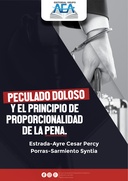Explore

Peculado Doloso y el Principio de Proporcionalidad de la Pena
0 Ungluers have
Faved this Work
Login to Fave
The present work starts from the problem when investigating how the same penalty for the crime of Fraudulent Embezzlement affects the principle of proportionality, so it is necessary to refer to Article 387 of the Penal Code, which reads as follows: The public official or servant who appropriates or uses, in any form, for himself or for another, funds or effects whose collection, administration or custody are entrusted to him by reason of his position, shall be punished with deprivation of liberty for not less than two nor more than eight years. It is an aggravating circumstance if the funds or effects were destined for welfare purposes or social support programs. In these cases, the prison sentence shall be not less than four nor more than ten years. According to the Plenary Agreement No. 4-2005/CJ-116, Plenary Jurisdiction of the Permanent and Transitory Criminal Chambers of the Supreme Court of Justice, the elements of the criminal offense of embezzlement are (i) the existence of a functional relationship, (ii) the collection, administration or custody, (iii) appropriation or use, (iv) the recipient: for himself or for a third party, (v) funds and effects. The result was that when punishing with the same penalty in the crime of Fraudulent Misappropriation in its modality of appropriation and use, despite the differences if we appreciate them from a patrimonial perspective or from the perspective of safeguarding the right of property of the public entity, in the modality of use there is an excess in the penalization, affecting the principle of proportionality, reason for which it should have a different treatment.
This book is included in DOAB.
Why read this book? Have your say.
You must be logged in to comment.
